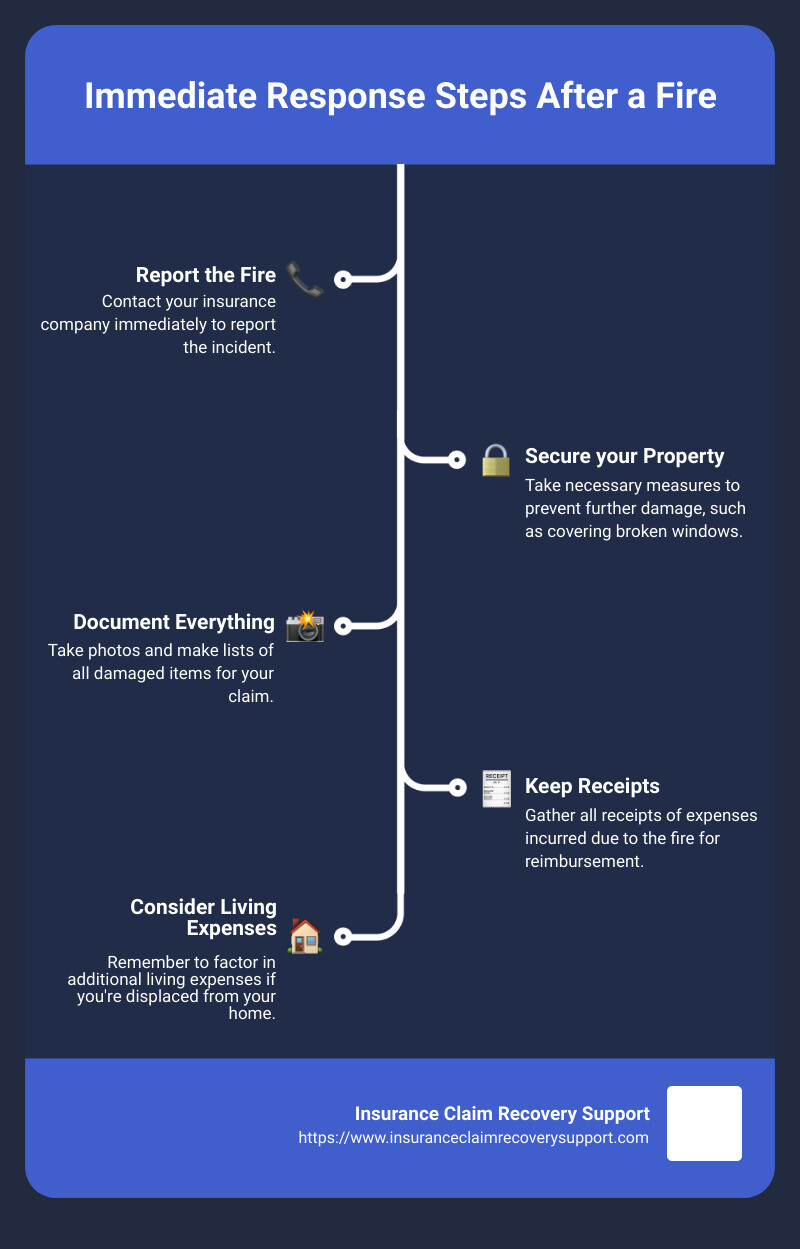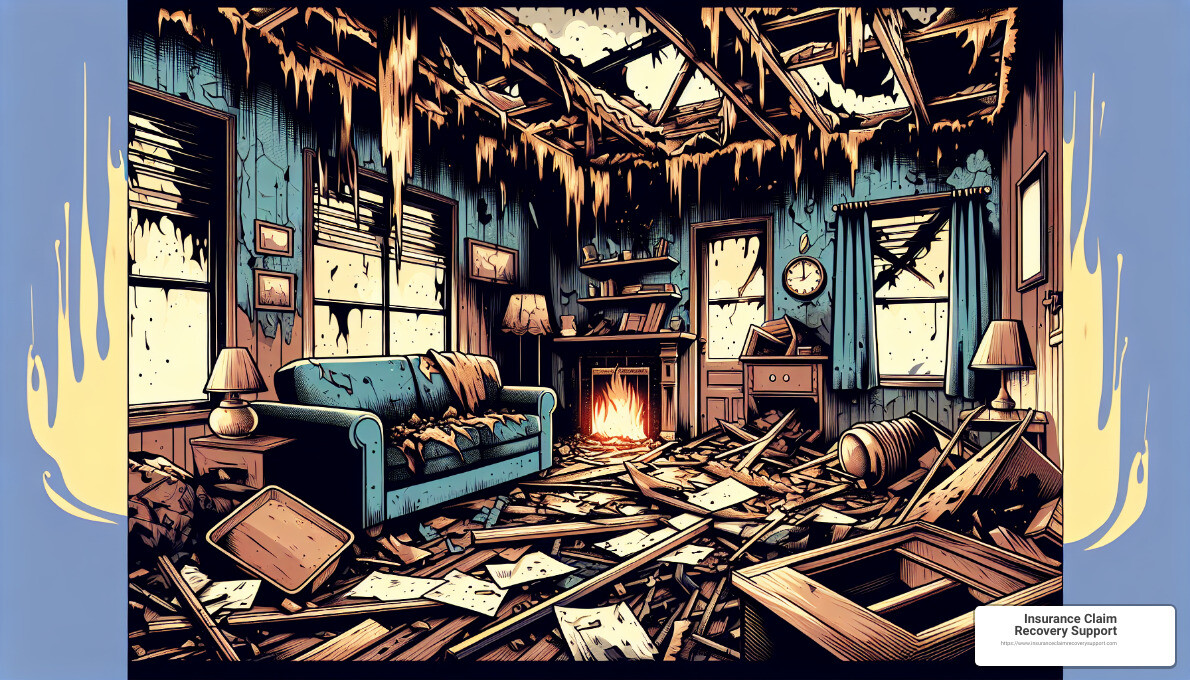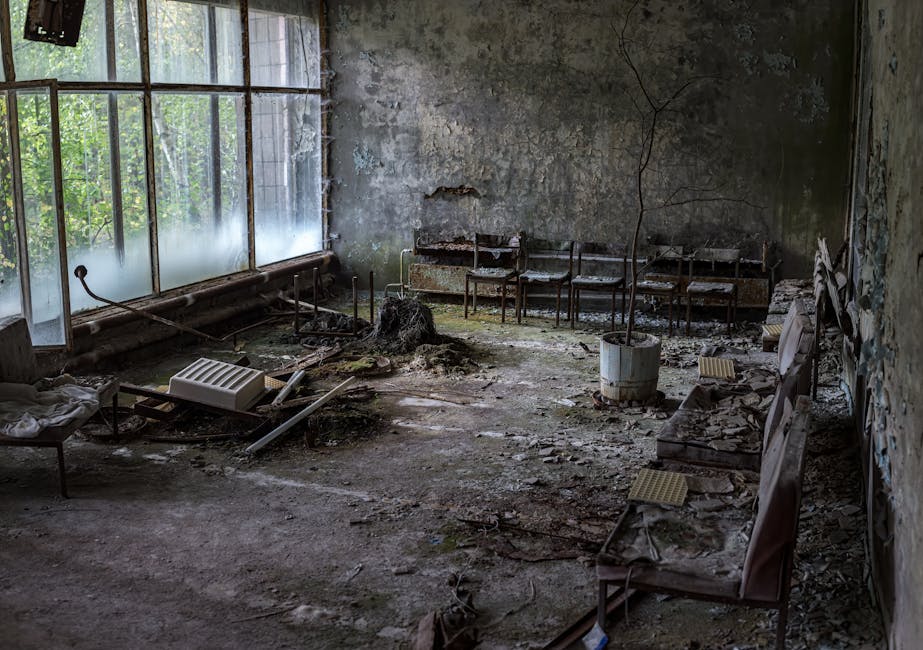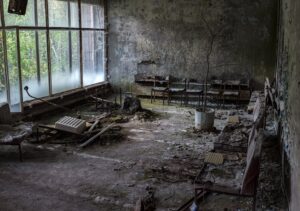Understanding fire claims and the importance of quick action
When your property catches fire, it’s a race against the clock. The promptness of your actions post-disaster can significantly affect the outcome of your fire insurance claim.
Quick steps for immediate response:
– Report the fire to your insurance company right away.
– Secure your property to prevent further damage.
– Document everything—take photos, make lists of damaged items.
– Keep receipts of any expenses incurred due to the fire.
With fire claims, knowing what to do and acting fast makes all the difference. It’s not just about filing your claim; it’s about ensuring a thorough, well-documented claim that covers the spectrum of your losses. This is especially crucial for commercial building property owners, multifamily complexes, apartment real estate investors, or religious organizations who face unique challenges post-disaster.

Understanding the ins and outs of your fire claim is the first step toward a fair and prompt settlement. It safeguards against delays, underpayments, or wrongful denials. Moreover, it underscores the importance of having a public adjuster in your corner to navigate the complex process, ensuring you receive what you rightfully deserve.
Preparing for a Fire Insurance Claim
When a fire damages your home, the aftermath can feel overwhelming. Knowing the right steps to take can significantly influence the outcome of your fire insurance claim. Here’s a straightforward guide to prepare effectively.
Documentation
Act Fast, Record Everything: As soon as it’s safe, begin documenting the damage. Use your smartphone or camera to take photos and videos of all affected areas—both the structure of your home and personal belongings. This visual evidence is crucial for your insurance claim.
Immediate Actions
Safety First: Ensure everyone is safe and accounted for. Then, focus on securing your property to prevent further damage. This might mean covering broken windows or holes in the roof with tarps. These initial steps are not just about limiting damage—they’re also about proving to your insurance company that you’re taking appropriate action to mitigate further losses.
Secure Property
Mitigate, Don’t Repair: While you might be tempted to start repairs immediately, it’s important to distinguish between mitigation and repair. Mitigate means taking temporary measures to secure your property, not fixing the damage completely. Your insurance company will want to assess the damage before any major repairs are undertaken.
Contact Authorities
File a Report: Contact your local fire department to report the incident, even if the fire was minor. A fire report can provide valuable information for your insurance claim. It’s an official record of what happened and can support your claim’s details.
By taking these steps, you’re not just preparing for a fire insurance claim; you’re also laying the foundation for a smoother recovery process. The goal is to secure your property, document everything, and communicate effectively with the authorities and your insurance company. This proactive approach can make a significant difference in the support and compensation you receive.
Navigating the aftermath of a fire can be challenging, but with the right preparation and knowledge, you can ensure that your fire claim help leads to a fair and prompt settlement. Always remember, documenting every detail, securing your property against further damage, and promptly contacting the necessary authorities are key steps in maximizing your recovery after a fire.
For more detailed guidance on how to proceed after a fire, including tips on dealing with your insurance company, visit How does a fire insurance claim work?.

Taking these initial steps diligently will not only help in securing a better outcome for your fire insurance claim but also ensure that your road to recovery is as smooth as possible.
Understanding Your Fire Insurance Coverage
When a fire strikes, the road to recovery starts with understanding your fire insurance coverage. This knowledge is your first tool in seeking fire claim help. Let’s break down what this coverage typically includes and what it means for you.
Dwelling Coverage
– What it is: This part of your policy covers the physical structure of your home. If a fire damages or destroys your house, dwelling coverage helps pay for repairs or rebuilding.
– Why it matters: Knowing your dwelling coverage limit is crucial. It’s the maximum amount your insurance will pay to fix or rebuild your home.
Personal Property
– What it is: This coverage is for the items inside your home. Think furniture, clothes, and electronics. If these items are damaged or destroyed in a fire, personal property coverage helps replace them.
– Why it matters: You’ll need to have a detailed inventory of your belongings to make a claim. The more accurate your list, the smoother the claim process.
Additional Living Expenses (ALE)
– What it is: If you can’t live in your home because of fire damage, ALE covers your temporary living costs.
– Why it matters: Understanding ALE helps you manage expenses while you’re displaced, ensuring you maintain a similar standard of living.
Exclusions
– What they are: These are situations your policy does not cover. For example, damage from an intentional fire set by the homeowner.
– Why it matters: Knowing what’s not covered prevents surprises during the claim process.
Open vs. Named Perils
– What they are: Open perils cover all sources of damage unless specifically excluded. Named perils require the cause of damage to be listed in the policy for coverage.
– Why it matters: Understanding whether your policy is open or named perils affects how you approach your fire claim. Open perils offer broader coverage, making it easier to get help after a fire.
By grasping these elements of your fire insurance coverage, you’re better equipped to navigate the claims process. This knowledge serves as a foundation for getting the fire claim help you need, ensuring you maximize your settlement and return to normalcy faster.
For more detailed guidance on fire claims and how to document losses after a fire, including tips on dealing with your insurance company, visit How does a fire insurance claim work?.
Taking these initial steps diligently will not only help in securing a better outcome for your fire insurance claim but also ensure that your road to recovery is as smooth as possible.

Understanding your coverage is just the beginning. Next, we’ll dive into the steps for filing a successful fire insurance claim, ensuring you’re well-prepared for the journey ahead.
Steps to Filing a Successful Fire Insurance Claim
When disaster strikes, the aftermath can feel overwhelming. But with the right steps, you can navigate the fire insurance claim process more smoothly. Here’s what you need to know:
Document Losses
Start by taking pictures and making lists of everything damaged or lost. It’s crucial to be as detailed as possible. Don’t forget to include:
– The date of purchase,
– The cost,
– And even receipts if you have them.
Your documentation will be the backbone of your claim.
Secure Property
Your next move should be to secure your property. This means:
– Boarding up windows,
– Covering roofs with tarps,
– And anything else that can prevent further damage.
This not only protects what’s left but also shows the insurance company you’re taking active steps to mitigate further losses.
Consider Living Expenses
If you can’t live in your home, keep track of your living expenses. Things like hotel bills, meals, and other costs can add up. Most policies cover these “additional living expenses,” but only up to a certain limit. Knowing what’s covered can help you manage your budget during this tough time.
File Claim Promptly
Time is of the essence. Contact your insurance company as soon as you can to file your claim. Delaying can not only put your claim at the end of a long line but could also affect the validity of your claim.
Track Communications
Keep a detailed record of all your communications with the insurance company. This includes:
– Emails,
– Calls (note the date, time, and summary of the conversation),
– And letters.
These records can be invaluable if there are disputes down the line.
By following these steps, you’re not just filing a claim; you’re laying down a path towards recovery. Each step is designed to not only support your claim but also to ensure that you’re not left out of pocket for any longer than necessary. Getting fire claim help early can make a significant difference in the outcome of your claim. For more insights on navigating the complexities of fire insurance claims, visit this helpful guide.
Navigating the Claims Process with Your Insurance Company
After experiencing a fire, embarking on the claims process can seem daunting. Yet, understanding each step can significantly ease the journey. Let’s break it down.
Adjuster’s Role
First up, the insurance adjuster. Think of them as the link between you and your insurance company. They assess the fire damage and play a critical role in determining how much the insurance company should pay you. While adjusters are professionals, they represent the insurance company’s interests, not yours.
Estimate Review
After the adjuster assesses the damage, they’ll give you an estimate. This is where you need to be vigilant. Review their estimate closely. It’s not uncommon for the first estimate to overlook certain damages or undervalue repairs. Don’t hesitate to question anything that doesn’t seem right.
Settlement Negotiation
Negotiation is almost an art. The first offer is rarely the best one. You have the right to negotiate for a fair settlement that covers your losses adequately. If the numbers don’t add up or feel insufficient, speak up. This is about getting what you deserve to rebuild your life.
Advance Requests
If you’re in immediate need of essentials like clothing or food, you can request an advance on your claim. This isn’t a loan but rather a part of your settlement given to you upfront. It’s a common practice and helps ease the financial strain as you navigate post-fire challenges.
Keeping Track of Expenses
While living away from your fire-damaged home, every penny spent on additional living expenses counts. Whether it’s hotel bills, meals, or other necessities, keep every receipt. Your insurance policy might cover these extra costs, but without documentation, you won’t get reimbursed.
Navigating the claims process is not about rushing through steps but ensuring each phase is handled with care and attention. Alongside seeking professional fire claim help, being informed and prepared can make a substantial difference in the outcome of your claim. For a deeper dive into managing this process effectively, here’s a resource that might help: Navigating Fire Insurance Claims.
Transitioning smoothly into the next phase of maximizing your fire claim settlement requires a good grasp of the steps we’ve just discussed. Let’s explore how to further enhance your claim’s value in the following section.
Maximizing Your Fire Claim Settlement
Maximizing your fire claim settlement is critical to ensure you have the necessary funds to recover and rebuild after a fire. Here are key areas to focus on:
Inventory Compilation
Start with a detailed inventory of all your lost or damaged property. Go room by room, listing items, their age, and their approximate value. This task may seem daunting, but it forms the foundation of your claim. Photos, purchase records, and even memory can be invaluable here.
Proof of Loss
A Proof of Loss is a formal document outlining your claim’s details. Accuracy here is crucial – any mistakes could delay or jeopardize your claim. Ensure you understand what’s required and submit it promptly.
Public Adjuster Benefits
Hiring a public adjuster can significantly impact your settlement. They understand the complexities of insurance policies and the claims process, positioning them to negotiate effectively on your behalf. A public adjuster works for you, not the insurance company, aiming to maximize your settlement. One homeowner doubled their insurance payout with the help of a public adjuster .
Negotiation Tips
- Understand Your Policy: Knowing your coverage details empowers you to argue for what you’re rightfully owed.
- Don’t Rush: Initial offers may not fully cover your losses. It’s okay to negotiate for a better settlement.
- Document Everything: Keep track of all communication and decisions made during the claim process.
Ethical Practices
It’s essential to approach your claim with honesty and integrity. Exaggerating losses not only breaches ethical standards but can also lead to claim denial or legal repercussions. Stick to the facts and provide accurate documentation to support your claim.
By focusing on these areas, you can enhance your chances of securing a fair and favorable settlement. The goal is not just to settle your claim but to ensure you are justly compensated for your losses. With careful documentation, the right professional help, and a clear understanding of your insurance policy, you’re better equipped to navigate the claims process and rebuild after the fire.
Transitioning from understanding your coverage and preparing your claim to maximizing your settlement is a crucial step in the fire claim process. Next, we’ll discuss how to handle potential challenges such as claim denials or underpayments, ensuring you’re fully prepared to secure the compensation you deserve.
Dealing with Claim Denials or Underpayments
After pouring your energy into submitting a detailed fire insurance claim, receiving a denial or facing an underpayment can feel like a heavy setback. However, this isn’t the end of the road. Understanding why claims are denied and how to effectively respond can significantly impact the outcome of your case.
Reasons for Denial
Insurance companies may deny fire claims for several reasons, including:
– Lack of coverage: The damage may not be covered under your policy.
– Late filing: Claims filed after the deadline can be denied.
– Incomplete documentation: Insufficient evidence of damage or losses can lead to denial.
– Suspected fraud: If the insurer suspects dishonesty, they’ll likely deny the claim.
It’s crucial to review the denial letter closely. It should explain why the claim was denied and how you can appeal the decision.
Reopening Claims
If you believe your claim was unjustly denied or underpaid, you have options. Start by contacting your insurance company to request a review or reopening of your claim. Be prepared to provide additional documentation or evidence to support your case.
Legal Assistance
Sometimes, you might hit a wall with your insurance company. This is where legal help can come in. An experienced attorney can offer fire claim help, guiding you through the appeals process or even representing you in a lawsuit against the insurer if necessary. Legal professionals understand the intricacies of insurance policies and can advocate for your rights effectively.
Insurance Company Obligations
Your insurance company has legal obligations. They must act in good faith, which means they should:
– Communicate promptly and clearly about the status of your claim.
– Conduct a thorough and fair investigation of your claim.
– Provide a reasonable explanation for any denial or underpayment.
If you suspect your insurance company is not fulfilling these obligations, mentioning your concerns to your legal counsel is crucial. They can advise you on the next steps, which may include filing a complaint with your state’s Department of Insurance or taking legal action.
Navigating the complexities of fire claim denials and underpayments can be daunting. However, with the right approach and support, you can effectively challenge these decisions and work towards securing the compensation you rightfully deserve. Whether through additional negotiations, legal action, or seeking the help of a public adjuster, there are pathways to resolving these challenges.
For more detailed guidance on handling fire insurance claims and disputes, visit How does a fire insurance claim work?.
Transitioning from dealing with denials and underpayments to understanding how Insurance Claim Recovery Support LLC can advocate for policyholders and maximize settlements is crucial for anyone navigating the aftermath of a fire.
Conclusion
In the journey of recovering from fire damage, the process can often feel overwhelming and complex. That’s where we, at Insurance Claim Recovery Support LLC, step in to make a significant difference. Our primary mission is to advocate for policyholders and maximize settlements, ensuring that you receive the full compensation you’re entitled to under your insurance policy.
Advocating for Policyholders
We understand that the aftermath of a fire is a challenging time for any homeowner or business. That’s why our team dedicates itself to being not just your representative but your advocate in dealings with insurance companies. Our expertise in the nuances of fire claims helps in navigating the complexities of the claims process with ease. We stand firmly on your side, ensuring that your voice is heard and your rights are protected every step of the way.
Maximizing Settlements
Our goal is to ensure that you do not just settle, but you maximize your claim settlement. This involves a thorough documentation of both visible and unseen damage, meticulous review of your insurance policy, and robust negotiation with the insurance company. We bring an unparalleled level of dedication and expertise to every claim, backed by a track record of securing rightful settlements for our clients. Our success stories, like the one where a homeowner’s settlement was doubled thanks to the intervention of a skilled public adjuster , underscore the value we bring to the table.
In conclusion, navigating a fire insurance claim doesn’t have to be a solitary struggle. With Insurance Claim Recovery Support LLC by your side, you have a team of experts committed to ensuring your recovery is as smooth and successful as possible. From advocating on your behalf to maximizing your settlement, our focus is on getting you the support you need to rebuild and move forward.
You don’t have to face this alone. Let us help you turn a challenging chapter into a story of successful recovery and resilience. Visit our Public Adjuster Services to learn more and get the fire claim help you deserve. Together, we can work towards a swift and fair resolution of your fire insurance claim, allowing you to focus on what matters most—recovery and rebuilding.










